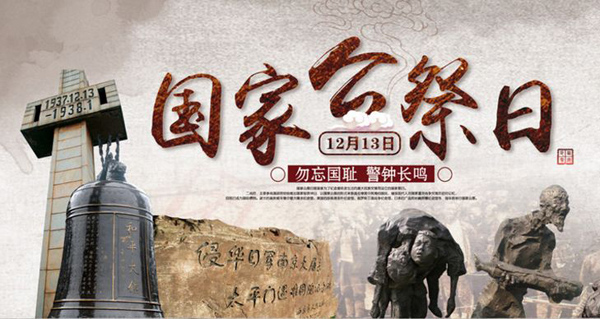|
英文《中国日报》12月13日刊登美籍记者兰迪•赖特(Randy Wright)撰写的文章《反思南京大屠杀:逃离阴影》,文中痛斥日本二战时在南京犯下的滔天暴行,呼吁日本向德国学习,承认错误向中国真心致歉。

以下为双语全文: It's with a somber heart that I find myself today contemplating the 80th anniversary of the infamous rape and slaughter of hundreds of thousands of innocent Chinese in Nanjing by invading Japanese troops in the winter of 1937-38.
12月13日是中国南京大屠杀死难者国家公祭日。回想80年前,侵华日军攻占南京并对几十万无辜的中国老百姓犯下屠杀、奸淫等血腥暴行,我的心情十分悲痛。
That collective atrocity - made up of thousands of individual atrocities committed over several weeks - shows at a breathtaking scale the nature of the beast at the heart of the human race and the danger of unchaining it. The Nanjing Massacre is among the ugliest incidents in world history, though far from unique in its depravity.
南京大屠杀是一起集体暴行,侵华日军在长达数周的时间里犯下数不清的暴行。这一惨绝人寰的事件以惊人的规模展现出人类内心隐藏的兽性以及放任兽性发展的恐怖。南京大屠杀是人类历史上最丑陋的事件之一,充斥着人性的邪恶。
I never served in uniform (an unfortunate gap in my life's experience), nor in combat. Yet my years of reading military history have taught me something of the horrors of war, the greed of nations, of man's inhumanity to man, the fragility of peace and the value of life. And the cycle continues.
我从来没有当过兵(这是我人生经历中一段不幸的空白),也没有参加过战役。但多年来阅读军事历史书籍让我知晓了战争的可怕、国家的贪婪、人性的残酷、和平的脆弱,以及生命的价值。如此循环生生不息。
In the ominous words of Plato: "Only the dead have seen the end of war."
古希腊哲学家柏拉图有一句警世之语:“只有死者才能看到战争的终结。”
I wish it were not so. Across millennia, emperors and assorted tyrants have murdered for land, treasure, religion or political power, and spun the rhetoric of hate and blame to achieve their ambitions. The result, sooner or later, is always the same: a river of blood - often the most precious.
我真希望不是这样。纵观历史,君王霸主为了土地、财富、宗教或政治权力而互相残杀,用仇恨憎恶的言语实现个人的野心。而结局,或早或晚,总是相似的:血流成河——死去的往往是社会的精英。
It's easy enough to see this pattern. But it's even easier to look away. A searing event like Nanjing is uncomfortable. It's hard to absorb. It's scarring. But to avert the eyes is to relegate history to mere abstraction, to conveniently forget that the victims of atrocities were real people.
看到这一规律很容易,但是无视它更容易。如南京大屠杀一般的惨案令人不安,它令人难以承受、留下创伤累累。逃避和漠视的态度相当于把真实发生过的历史降格为纯粹的抽象概念,相当于选择性地忘记遭受这些暴行的那些活生生的人。
Remembrance is the beginning of healing. In fact, the bitter dregs of truth have curative value for the soul - especially for past aggressors like the Japanese, who, in dehumanizing their victims, only dehumanized themselves.
铭记才是治愈的开始。事实上,真相的苦涩可以治愈人类的灵魂,对于那些曾经的侵略者,比如日本人,更是如此。他们对受害者施以非人的暴行,使他们自己也失去了人性。
Some in Japan seem to have difficulty with deep reflection. They just want the war to go away, and have chosen a path on which the goal is to save as much face as possible. What Japan has styled as apology over the years has been half-hearted, not full-throated; and that, in turn has allowed bitterness to linger.
在日本,有一些人似乎很难进行深刻反思,他们只想要战争的阴云散去,并且选择了一条尽可能地保存颜面道路。过去这些年来,日本人口口声声的道歉根本不是真心实意的,而这,只会让痛苦继续。
Instead, it should follow the spirit of former German chancellor Willie Brandt, who knelt humbly in the rain in 1970 at the Warsaw Ghetto, acknowledging the evil Nazi Germany brought upon the Jews. It should adopt the posture of Angela Merkel, the current German chancellor, whose stance was unequivocal when Israel's leader tried to shift blame for the Holocaust to an Islamic cleric: "All Germans know the history of the murderous race mania of the Nazis that led to the break with civilization that was the Holocaust," Merkel's spokesman said. "This is taught in German schools for good reason. It must never be forgotten. ... We know that responsibility for this crime against humanity is German, and very much our own."
日本应当向德国前总理维利•勃兰特看齐。1970年,勃兰特冒雨在犹太人纪念碑前下跪,承认纳粹德国给犹太人带去的深重苦难。日本应当学习德国现任总理默克尔的姿态,当以色列领导人试图将犹太大屠杀的罪责转嫁给一名伊斯兰教士时,默克尔态度明确地表示:“我们全体德国人都非常清楚,纳粹的种族狂热导致文明崩塌,即犹太大屠杀。”默克尔的发言人说:“我们在德国学校里教授这段历史是有充分理由的。这段历史永远不能遗忘……我们知道,这一反人类罪行的责任在于德国,并且都是我们自己的罪责。”
Likewise, the massacre in Nanjing is very much Japan's own.
同样,南京大屠杀的发生也都是日本的罪责。
Are these just empty words, bleached of meaning by the passage of time? I don't think so. Nor is a Japanese apology merely a question of making China feel better. Japan itself will never escape the shadow of its past until it can wash itself clean through honest, forthright acknowledgement of its sins.
这些空洞的语言会随着时间的流逝而褪色吗?我不这么认为。日本道歉也不仅仅是让中国好受一点的问题。日本要走出历史留下的阴影,必须坦诚、坦率地承认自己犯下的罪行以净化自身。
|  /3
/3 